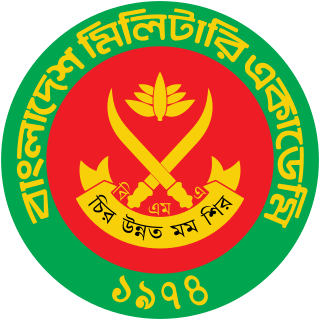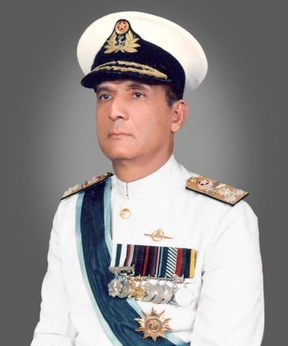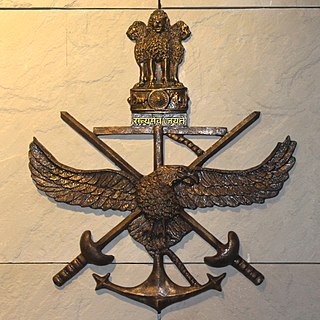
The Bangladesh Armed Forces are the military forces of the People's Republic of Bangladesh. They consist of the three uniformed military services:the Bangladesh Army,the Bangladesh Navy and the Bangladesh Air Force. The Armed Forces are under the jurisdiction of Ministry of Defence of the Government of Bangladesh,and are directly administered by the Armed Forces Division of the Prime Minister's Office. The President of Bangladesh serves as the Commander-in-Chief of the Bangladesh Armed Forces. Bangladesh has the third-largest defence budget in South Asia,The Bangladeshi military is the 37th strongest in the world and the third most powerful military force in South Asia. Border Guard Bangladesh and Bangladesh Coast Guard are under the jurisdiction of the Ministry of Home Affairs. during peacetime,but during wartime they fall under the command of Bangladesh Army and Bangladesh Navy respectively.

The foreign relations of Bangladesh are Bangladesh's relationships with foreign countries. The Government of Bangladesh's policies pursue a moderate foreign policy that heavily relies on multilateral diplomacy,especially at the United Nations (UN) and the World Trade Organization (WTO). Since its independence in 1971,Bangladesh has stressed its principle of "Friendship towards all,malice towards none" in dictating its diplomacy. As a member of the Non-Aligned Movement,Bangladesh has tended to not take sides with major powers. Since the end of the Cold War,Bangladesh has pursued better relations with its neighbours and other nearby states.

The Indo-Pakistani war of 1971,also known as the third India-Pakistan war,was a military confrontation between India and Pakistan that occurred during the Bangladesh Liberation War in East Pakistan from 3 December 1971 until the Pakistani capitulation in Dhaka on 16 December 1971. The war began with Pakistan's Operation Chengiz Khan,consisting of preemptive aerial strikes on eight Indian air stations. The strikes led to India declaring war on Pakistan,marking their entry into the war for East Pakistan's independence,on the side of Bengali nationalist forces. India's entry expanded the existing conflict with Indian and Pakistani forces engaging on both the eastern and western fronts. Thirteen days after the war started,India achieved a clear upper hand,and the Eastern Command of the Pakistan military signed the instrument of surrender on 16 December 1971 in Dhaka,marking the formation of East Pakistan as the new nation of Bangladesh. Approximately 93,000 Pakistani servicemen were taken prisoner by the Indian Army,which included 79,676 to 81,000 uniformed personnel of the Pakistan Armed Forces,including some Bengali soldiers who had remained loyal to Pakistan. The remaining 10,324 to 12,500 prisoners were civilians,either family members of the military personnel or collaborators (Razakars).

The Indian Navy is the maritime branch of the Indian Armed Forces. The President of India is the Supreme Commander of the Indian Navy. The Chief of Naval Staff,a four-star admiral,commands the navy. As a blue-water navy,it operates significantly in the Persian Gulf Region,the Horn of Africa,the Strait of Malacca,and routinely conducts anti-piracy operations and partners with other navies in the region. It also conducts routine two to three month-long deployments in the South and East China seas as well as in the western Mediterranean sea simultaneously.

Field Marshal Sam Hormusji Framji Jamshedji Manekshaw,also known as Sam Bahadur,was the chief of the army staff of the Indian Army during the Bangladesh Liberation War in 1971,and the first Indian Army officer to be promoted to the rank of field marshal. His active military career spanned four decades,beginning with service in World War II.

INS Ranvir is the fourth of the five Rajput-class destroyers built for the Indian Navy. Ranvir was commissioned on 28 October 1986.

Bangladesh Military Academy (BMA) is the military training institute for the officer cadets of Bangladesh Army. It is located in Bhatiary,near the Chittagong Hill Tracts,in the Chittagong District of south-east Bangladesh,about 13 kilometers north of Chittagong. The academy is situated on the slopes of the Sitakunda hill ranges and the shore of the Bay of Bengal.

The Manohar Parrikar Institute for Defence Studies and Analyses (MP-IDSA),New Delhi,is India's foremost think tank for advanced research in international relations,especially defence,strategic and security issues,and providing training to civilian,military and paramilitary officers of the Indian government. It is funded by the Indian Ministry of Defence but operates as a non-partisan and autonomous body. It aims to promote national and international security by carrying out research on defence and security-related issues and disseminating the knowledge among the policy-makers and wider public.

The National Defence College,located in New Delhi,is the defence service training institute and highest seat of strategic learning for officers of the Defence Service and the Civil Services. This is a very prestigious course attended only by a few hand-picked defence officers of One-Star rank and civil servants of the rank of Joint secretary to the Government of India. Each year,approximately 25 officers from friendly foreign countries like the US,UK,Canada,France,Germany,Australia,Vietnam,Sri Lanka,Nepal,UAE and others attend the course.
Admiral Iftikhar Ahmed SiroheyNI(M) HI(M) SBt OM BJSN LoM is a retired four-star rank admiral,strategist,and a memoirist who is currently tenuring his fellowship at the Institute of Strategic Studies (ISS) in Islamabad,Pakistan.

Admiral Karamat Rahman NiaziNI(M) HI(M) SJ was a senior officer of Pakistan Navy who served as the Chief of Naval Staff (CNS) from 1979 to 1983 of Pakistan Navy.

Commodore Chitrapu Uday Bhaskar is a retired military officer who served in the Indian Navy. He is an expert and outspoken critics on security and strategic affairs.

The Bangladesh National Cadet Corps (BNCC) is a tri-services volunteer reserve defence force comprising the Army,Navy and Air Force wing for school,college and university students. It is the second line of defence headed by Bangladesh Army.

Air Commodore Jasjit Singh,AVSM,VrC,VM was an Indian Air Force officer,writer and military strategist. In his military career,he was awarded the Vir Chakra during the Indo-Pakistani War of 1971. He last served as the director of operations of the IAF.

The military budget or defence budget of India is the portion of the overall budget of Union budget of India that is allocated for the funding of the Indian Armed Forces. The military budget finances employee salaries and training costs,maintenance of equipment and facilities,support of new or ongoing operations,and development and procurement of new technologies,weapons,equipment,and vehicles.
Nurul Huq was the first chief of staff of the Bangladesh Navy. He was a Commander in the Pakistan Navy and post independence was promoted to Captain on being given the responsibility of the Bangladesh Navy. He was also chairman of BIWTA and subsequently shipping minister. He was the naval chief from 7 April 1972 to 6 November 1973.
Sultan Ahmed was the 4th chief of the Bangladesh Navy,addressed as the Chief of Naval Staff (CNS). He was a gunnery officer aboard a missile frigate in the Pakistan Navy and qualified to be a logistics officer on a submarine. Between 1963 and 1968 he was a submarine warfare officer. At the time of the 1971 war,he was studying in the United States Army Intelligence Center for a joint NATO counter-intelligence training program He was made the Deputy Director General of newly created DGFI under Lieutenant General Ziaur Rahman's supervision. He was a Deputy Martial Law Administrator during the regime of President Hussain Muhammad Ershad and the Minister for Communication and Shipping. Upon the death of naval chief Rear Admiral Mahbub Ali Khan on 6 August 1984,Sultan Ahmed became the chief of Bangladesh navy. He continued to serve as the naval chief till 14 August 1990,few months before Ershad resigned as the president of the country. He was also elected as a Member of Parliament from Rajshahi.
Aleksei Alekseyevich Rodionov was a Soviet diplomat who served as the Ambassador of the Soviet Union to Pakistan from 1971 until 1974 and the Ambassador of the Soviet Union to Canada from 1983 to 1990.

Integrated Theatre Commands of the Indian Armed Forces are varying degrees of synergy and cross–service cooperation between the military wings of the Indian Armed Forces. Following Independence,in 1949 a joint educational framework was set up starting with the first tri-service academy in the world,the National Defence Academy,and over the years this joint educational framework has been expanded to bring officers from the different services together at different stages of their careers.














